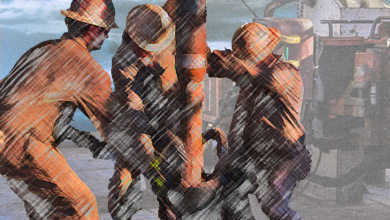Setting industry standards
IADC KSAs for 70-plus rig-based positions near completion

By Amy Rose, IADC director of external relations
The IADC Knowledge, Skills, and Abilities (KSAs) project is nearing completion. With a database comprising core competencies for more than 70 rig-based positions, the IADC KSAs provide a tool for the industry to demonstrate their personnel’s qualifications.
“The KSA project was initially undertaken in 2000, with the creation of KSAs for 12 rig positions. In 2012, at the request of regulators and the industry, we revisited this project and recognized that now was the time to expand on what was originally developed,” said Mark Denkowski, IADC vice president, accreditation and credentialing. “IADC provided the space for the drilling community to come together and take a critical look at each rig position to determine the core competencies that each individual needs to safely perform their job duties.”
Six main workgroups oversaw the creation of the KSAs: Drilling Onshore, Drilling Offshore, Subsea Operations, Marine Operations, Technical Maintenance, and QHSE/Process and Procedures. More than 70 people participated to make the new KSAs a reality.
“I feel it is important that all drilling contractors and related service companies have a resource to help develop their own internal competency programs. This is what the KSA project will provide,” said Eliot Doyle, supervisor, training and development with Ensco and a member of the Drilling Offshore workgroup. “Ensco contributed by providing positional-knowledge content for various offshore drilling disciplines and roles. These are very specific competence elements. We felt it was important to contribute to this project as we have a lot of historical data from our internal competency programs to share, and it also provided an opportunity to collaborate with our peers in the industry.”
Many people, representing drilling contractors, major oil companies and training entities, contributed to defining, categorizing and mapping KSAs to the rig-based positions. “This effort will go a long way toward defining the KSAs required for each key role involved in the drilling process. The development of an industry set of core competencies for position-specific KSAs will allow organizations to compare and benchmark their own efforts against this structure. The result should be greater consistency of position requirements across the industry,” Terry Guth, learning and development manager for Parker Drilling, said. He served on the Drilling Offshore and Drilling Onshore workgroups.
The KSAs are contained in a database that will become accessible via the IADC website in the coming months. It will be a free resource that allows the drilling community to generate a unique set of KSAs for the user’s company based on position, rig type and operational environment.
“The KSA database allows individuals and companies to have competencies at their fingertips,” said Brooke Comeaux Polk, IADC competence and learning development specialist. “What is great about the database is that the KSAs are fully customizable and can be tailored to meet individual company needs.”
The scope of the project recently expanded to include development of KSAs by a Well Servicing workgroup, which is developing KSAs specific to well servicing operations. A target completion date has been set for mid-2014.
“There is a growing emphasis on assuring competency,” said Peter Bennett, director, subsea support, Pacific Drilling, and a member of the Subsea workgroup. “The KSA database provides what industry professionals have identified as the knowledge and skills required for a range of positions. I believe an additional benefit of the KSAs will be as a tool used by recruiters, HR and rig management in identifying new-hire and promotional candidates. Management can also use the database to build competency assessments and to plan training where needed.”
Mr Guth added: “Ultimately, the KSAs and related competency assurance programs will be at the core of assessment, selection, development and career pathways across the oil and gas industry. In terms of development, I would expect individual oil and gas companies, training providers and colleges to incorporate these KSAs into their future curriculum.”
Linda Head, associate vice chancellor for workforce education and corporate partnerships at Lone Star Community College, noted that the KSAs will assist in building curricula for the IADC Workforce Attraction and Development Initiative (WADI). She is member of the KSA Drilling Onshore workgroup.
“As a professional workforce educator, I have spent more than 25 years developing workforce credit and non-credit programs,” Ms Head explained. “We have invited business and industry representatives to participate in focus groups to identify workforce needs. Never have we had business and industry ask us, as educators, to meet with them to help them address their workforce needs. Never have we worked to determine the competencies, rather than just the higher-level learning outcomes. Never have they invited us to be an equal partner in developing the solution. And never have they spent a year to ensure they got it right!”
The 30-plus colleges participating in the WADI program are working with IADC and industry representatives to develop competency-based, industry-led training in a true career pathway model. The effort is evolving from a local cooperation among three Houston-area colleges to a national and international collaboration among colleges and industry stakeholders that aims to provide a talented workforce pool in the oil and gas drilling and production industry.
“Looking into the future, I believe that the KSAs will have a huge immediate impact on the industry,” Mr Denkowski said. “At IADC, we believe the workgroups have helped the drilling community reach an important milestone by delivering a product that will raise the level of competency for each and every worker on a rig.”



